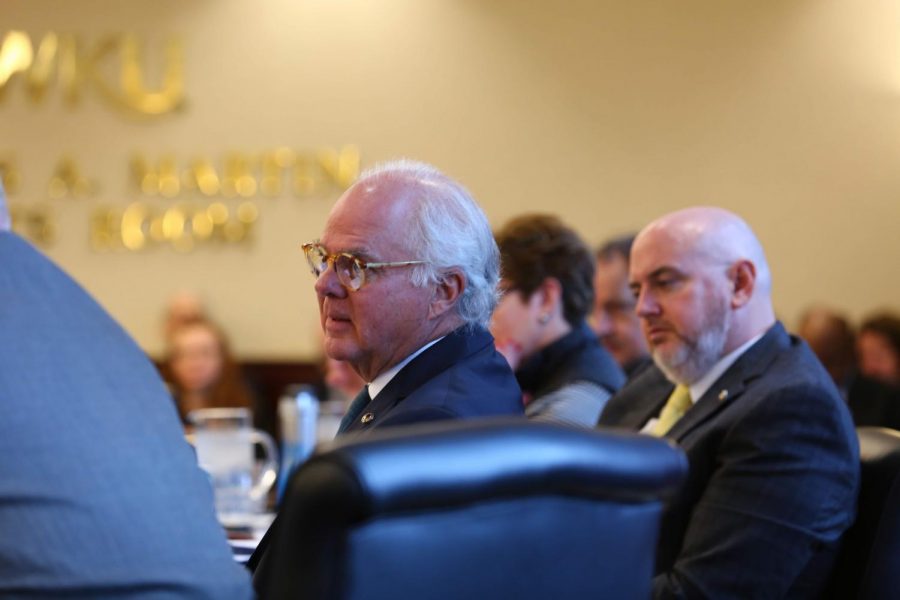WKU regents approve 2021-22 budget with tuition and pay increases
In today’s Board of Regents meeting, the regents approved the 2021-22 fiscal year budget. The regents approved a $375.6 million operating budget for fiscal year 2022.The total budget is down $12 million, or 3.2%, from fiscal year 2020.
June 18, 2021
The Board of Regents approved WKU’s budget for the 2022 fiscal year with a $5.8 million deficit during a special meeting Friday – a gap that will be addressed through one-year cuts during the budget year.
The budget includes a 2% hike in tuition costs for undergraduate students, to $5,496 a semester for in-state students, and a 2% salary pool that will take effect in January 2022.
The regents approved a $375.6 million operating budget for fiscal year 2022.The total budget is down $12 million, or 3.2%, from fiscal year 2020.
After a year of handing COVID-19, online learning had become a necessary option for students, leading regents to approve eliminating the online learning fee that had been $150 per credit hour. Removing the fee was recommended by the university-wide group that compiled the budget and endorsed by President Timothy Caboni.
Susan Howarth, executive vice president for strategy, operations and finance, said the $95 per semester increase in tuition won’t cost students as much as the distance learning fee would’ve.
However, tuition is the largest source of revenue for the university, standing at 48% or $180,357,700 for fiscal year 2021-22.
The Kentucky Council on Postsecondary Education enacted a statewide tuition and fee-setting schedule in May, enabling the university to increase tuition a maximum of 3% over the next two years, with a one-year maximum of 2%.
Mandatory student fees, which are included with tuition, will not increase. Currently, students pay $218 for a student athletics fee, student centers fee of $62, DSU renovation fee of $70 and a parking structure fee for Creason bonds of $30.
Officials think WKU’s enrollment will hold relatively steady for the Fall 2021 semester.
“At this point, there’s no need for us to be concerned,” Howarth said, adding that paid housing deposits and application fees indicate that the incoming freshman class should be stable, despite the challenges of recruiting during the coronavirus pandemic.
Another area of focus was the salary pool, which was made possible by the hike in tuition.
The salary pool was originally recommended at 1.5%, as recommended by the BEC but was raised to 2% when Caboni shifted money to the salary pool that had been earmarked for a strategic initiative fund.
“Those salary adjustments will become effective Jan. 1,” Howarth said, “and it’s still to be determined how that salary increase will be distributed.”
According to the budget, personnel costs account are the single largest area of WKU’s budget, at 43%.
In a separate meeting, the regents’ finance and budget committee approved personnel actions, which resulted in higher salaries for some positions at the university.
Bud Fischer, the new provost and vice president of academic affairs, will be paid a salary of $280,000, an increase from the $255,000 that was budgeted for the provost’s position in the current year. David Brown, the new dean of Ogden College, will be paid $250,000, up from $158,652 budgeted for the current year; while Terrance Brown, the new dean of Potter College, will make $157,002, up from $154,500 budgeted for 2020-21.
The committee also approved the hiring of Renaldo Neal Domoney as assistant vice president for budget, finances and analytics for $125,000, up from $84,996 budgeted in the current year; and Jessie Napier as the director of internal audit for $115,000, up from $73,392 budgeted for the current year.
Caboni said the salary increases are necessary to attract people to those positions.
“It’s one of the challenges we face as a university is that when you go outside to the market to recruit that can create compression,” Caboni said. “Our strategy is all about attracting talent, but also retaining talent.”
Digital News Editor Debra Murray can be reached at [email protected]. Follow her on Twitter @debramurrayy
























